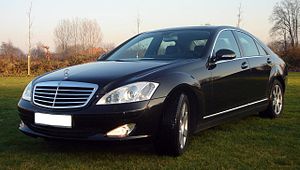Our website is made possible by displaying online advertisements to our visitors.
Please consider supporting us by disabling your ad blocker.
Portal:Cars
The Cars PortalA car, or an automobile, is a motor vehicle with wheels. Most definitions of cars state that they run primarily on roads, seat one to eight people, have four wheels, and mainly transport people rather than cargo. There are around one billion cars in use worldwide. The French inventor Nicolas-Joseph Cugnot built the first steam-powered road vehicle in 1769, while the Swiss inventor François Isaac de Rivaz designed and constructed the first internal combustion-powered automobile in 1808. The modern car—a practical, marketable automobile for everyday use—was invented in 1886, when the German inventor Carl Benz patented his Benz Patent-Motorwagen. Commercial cars became widely available during the 20th century. The 1901 Oldsmobile Curved Dash and the 1908 Ford Model T, both American cars, are widely considered the first mass-produced and mass-affordable cars, respectively. Cars were rapidly adopted in the US, where they replaced horse-drawn carriages. In Europe and other parts of the world, demand for automobiles did not increase until after World War II. In the 21st century, car usage is still increasing rapidly, especially in China, India, and other newly industrialised countries. Cars have controls for driving, parking, passenger comfort, and a variety of lamps. Over the decades, additional features and controls have been added to vehicles, making them progressively more complex. These include rear-reversing cameras, air conditioning, navigation systems, and in-car entertainment. Most cars in use in the early 2020s are propelled by an internal combustion engine, fueled by the combustion of fossil fuels. Electric cars, which were invented early in the history of the car, became commercially available in the 2000s and are predicted to cost less to buy than petrol-driven cars before 2025. The transition from fossil fuel-powered cars to electric cars features prominently in most climate change mitigation scenarios, such as Project Drawdown's 100 actionable solutions for climate change. (Full article...) Entries here consist of Good and Featured articles, which meet a core set of high editorial standards.
The Ford Piquette Avenue Plant is a former factory located within the Milwaukee Junction area of Detroit, Michigan, in the United States. Built in 1904, it was the second center of automobile production for the Ford Motor Company, after the Ford Mack Avenue Plant. At the Piquette Avenue Plant, the company created and first produced the Ford Model T, the car credited with initiating the mass use of automobiles in the United States. Prior to the Model T, several other car models were assembled at the factory. Early experiments using a moving assembly line to make cars were also conducted there. It was also the first factory where more than 100 cars were assembled in one day. While it was headquartered at the Piquette Avenue Plant, Ford Motor Company became the biggest U.S.-based automaker, and it would remain so until the mid-1920s. The factory was used by the company until 1910, when its car production activity was relocated to the new, larger Highland Park Ford Plant. Studebaker bought the factory in 1911, using it to assemble cars until 1933. The building was sold in 1936, going through a series of owners for the rest of the 20th century before becoming a museum in 2001. The Piquette Avenue Plant is the oldest purpose-built automotive factory building open to the public. The museum, which was visited by over 31,000 people in 2018, has exhibits that primarily focus on the beginning of the United States automotive industry. The building was added to the National Register of Historic Places in 2002, became a Michigan State Historic Site in 2003, and was designated a National Historic Landmark in 2006. (Full article...) Selected article - Bayerische Motoren Werke AG, trading as BMW Group (commonly abbreviated to BMW (German pronunciation: [ˌbeːʔɛmˈveː] ⓘ), sometimes anglicised as Bavarian Motor Works), is a German multinational manufacturer of luxury vehicles and motorcycles headquartered in Munich, Bavaria, Germany. The company was founded in 1916 as a manufacturer of aircraft engines, which it produced from 1917 to 1918 and again from 1933 to 1945 creating engines for aircraft that were used in the Second World War. The company's automobiles are marketed under the BMW, Mini and Rolls-Royce brands, and motorcycles are marketed under the BMW Motorrad brand. In 2023, BMW was the world's ninth-largest producer of motor vehicles, and the 6th largest by revenue, with 2,555,341 vehicles produced in that year alone. In 2023, the company was ranked 46th in the Forbes Global 2000. The company has significant motor-sport history, especially in touring cars, sports cars, and the Isle of Man TT. (Full article...) Selected picture of the day
Selected biography -Leilani Maaja Münter (born February 18, 1974) is an American former professional stock car racing driver and environmental activist. She last competed in the ARCA Menards Series, and previously drove in the Firestone Indy Lights, the development league of IndyCar. (Full article...) On this day February 7
Did you know...
Selected quote of the dayThe Aston Martin DB9 is the car that I'd be most likely to sell my children into slavery for. TopicsGeneral imagesThe following are images from various car-related articles on Wikipedia.
CategoriesThings you can do to help If you wish to help, you can:
Associated WikimediaThe following Wikimedia Foundation sister projects provide more on this subject:
Discover Wikipedia using portals |
Previous Page Next Page













































































